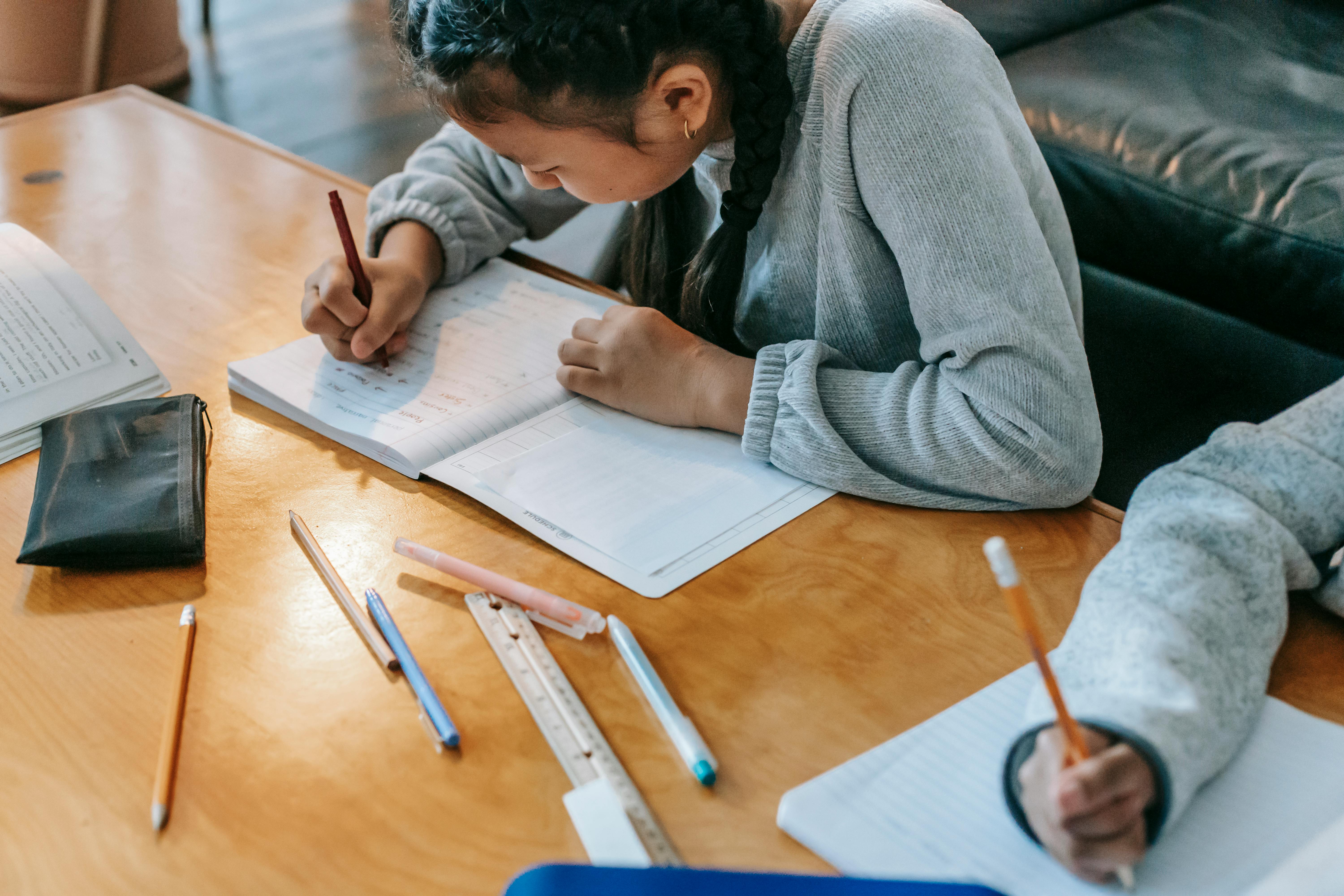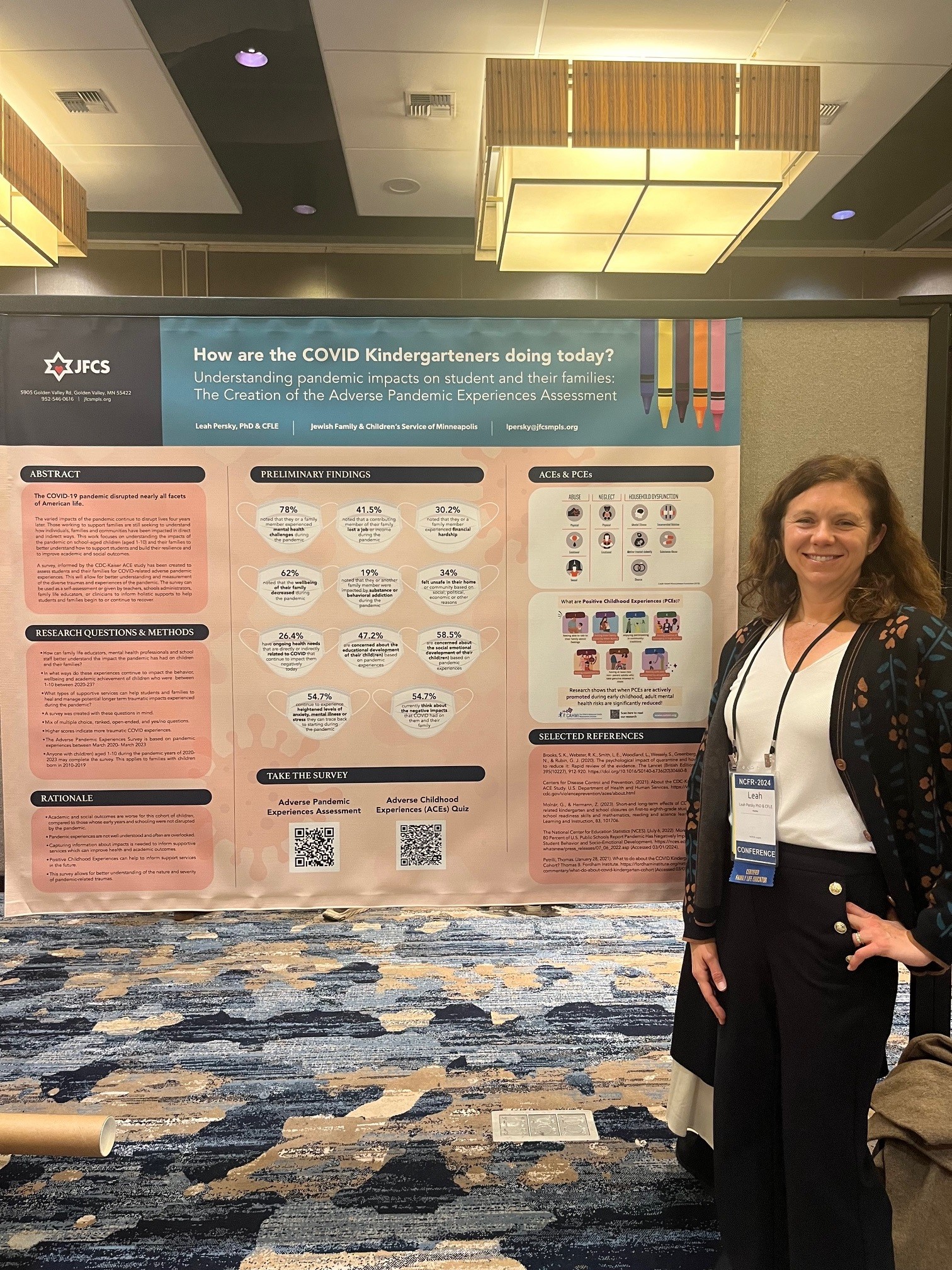How are the COVID kindergarteners doing today? Understanding pandemic impacts on children and their families

How can we support healing and resilience?
By Leah Persky, PhD & CFLE • Parent Coach and Manager of Professional and Community Education
I was able to attend the National Conference on Family Relations (NCFR) Conference last month in Bellevue, Washington. NCFR is the national professional organization focused on understanding families through interdisciplinary research, theory, and practice. I created an assessment tool to better understand the experiences of families who had young children during the pandemic, and my proposal to share the research was accepted into the conference.

I began this research because I have been thinking a lot about the long-term impacts of the pandemic ever since it “ended” in 2023. I think about how three years of disrupted school, life, health, and social development were impacted for young kids and wondering how these experiences impact them today. COVID‐related stressors included the closing of schools, economic hardship, loss of loved ones, interruption of everyday routines, the switch to remote learning, increased fear and uncertainty in daily life, and social isolation for many (Brooks et al., 2020; Cluver et al., 2020). These are diverse and major traumas that many children and families have not fully processed or healed from.
Children and their families are still impacted by the traumas of the pandemic – leading to generalizations about poor behavior and lack of academic success for students today, hence the term “COVID Kindergartners” to identify the children who began school in 2019 (Molnár and Hermann, 2023; Petrilli, 2021). This cohort is now in fourth or fifth grade, and their experiences are also applicable to other children who missed crucial years of learning and social development (Petrilli, 2021).
Research indicates that student behavior is worse today than prior to the pandemic, primarily due to lack of student social-emotional development and limited school attendance during formative years. Many educators highlight the high behavioral and academic needs of the cohort of current elementary students in the post-COVID era as a consequence of the interruption of school due to the pandemic.
In 2021, 87 percent of public schools reported that the pandemic negatively impacted student socio-emotional development, according to the National Center for Education Statistics. It is necessary to better understand the needs of children and their families in order to provide holistic support; this is where an assessment tool comes in.
This topic impacts me personally and professionally. My children were in kindergarten and third grade when the pandemic started. They have faced a variety of challenges that I link back to the pandemic. As a coach, I also work with many families who are working to support their young children; the challenges they are working through seem more challenging today. Also, it doesn’t seem like there is much attention given to this subject after the world returned to post-pandemic life and business.
This research will help to inform multiple JFCS programs including: Parent Coaching, Counseling, Mental Health Services and ParentChild+ ; these programs are all equipped to help support families and children and consistently work to meet the changing needs of our community.
While the research is still in the early stages, I believe the results of it will assist social service agencies and schools in their efforts to holistically support families and help to heal and recover from past pandemic-related challenges. Devoting time and research to this topic is important and will allow for a better grasp of these dynamic needs.
I am continuing to work on this project and would be very happy if you could take a short survey and/or share with friends and family to enhance the research efforts. It will take just a few minutes to complete. The questions are designed for families who had children aged 1-10 during the pandemic years of 2020-23, applying to families with children born 2010-19. It is informed by the CDC-Kaiser ACE (Adverse Childhood Experiences), which explores how traumas experienced early in life are connected to long-term health outcomes. More traumas experienced as a child are connected with poorer mental and physical health outcomes (to learn more about this research see https://www.cdc.gov/violenceprevention/aces/about.html).
All information collected is anonymous and cannot be traced back to an individual or family. The data collected will allow for a better understanding of the diverse impacts of the pandemic on children and their families. If you have any questions or want to discuss this, please do reach out to me at lpersky@jfcsmn.org. I will keep you posted on the next steps in this research.
You can find the survey here: https://forms.gle/5GpjFoHCfZcgSoZ87
Thank you!
References
- Brooks, S. K., Webster, R. K., Smith, L. E., Woodland, L., Wessely, S., Greenberg, N., & Rubin, G. J. (2020). The psychological impact of quarantine and how to reduce it: Rapid review of the evidence. The Lancet (British Edition), 395(10227), 912-920. https://doi.org/10.1016/S0140-6736(20)30460-8
- Cluver, L., Lachman, J. M., Sherr, L., Wessels, I., Krug, E., Rakotomalala, S., Blight, S., Hillis, S., Bachman, G., Green, O., Butchart, A., Tomlinson, M., Ward, C. L., Doubt, J., & McDonald, K. (2020). Parenting in a time of COVID-19. The Lancet (British Edition), 395(10231), e64-e64. https://doi.org/10.1016/S0140-6736(20)30736-4
- Molnár, G., & Hermann, Z. (2023). Short-and long-term effects of COVID-related kindergarten and school closures on first-to eighth-grade students’ school readiness skills and mathematics, reading and science learning. Learning and Instruction, 83, 101706.
- The National Center for Education Statistics (NCES). (July 6, 2022). More than 80 Percent of U.S. Public Schools Report Pandemic Has Negatively Impacted Student Behavior and Socio-Emotional Development. https://nces.ed.gov/whatsnew/press_releases/07_06_2022.asp (Accessed 03/01/2024)
- Petrilli, Thomas. (January 28, 2021). What to do about the COVID Kindergarten Cohort? Thomas B. Fordham Institute. https://fordhaminstitute.org/national/commentary/what-do-about-covid-kindergarten-cohort (Accessed 03/01/24)
